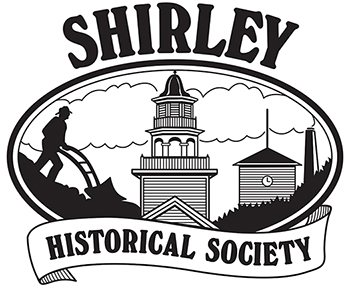Shirley, Massachusetts, in 1873
![]() is situated in the north-westerly section of Middlesex County, 40 miles north-West of Boston by the Boston and Fitchburg Railroad. It has two postal centres, Shirley and Shirley Village.
is situated in the north-westerly section of Middlesex County, 40 miles north-West of Boston by the Boston and Fitchburg Railroad. It has two postal centres, Shirley and Shirley Village.
It is well supplied with water and waterpower. Aside from several ponds which diversify the scenery, it has the Squannacook River for its north-eastern. and the beautiful Nashua River for its eastern border. Into the latter stream flows Malpus Brook through central, and Catacunnemug Brook through the southern section of the town. On the margin of these streams are some rich intervals, on which fine crops of hay are annually produced.
The soil of the uplands is light and sandy, and covered to a considerable extent by a growth of oak and hard-pine timber. There are four saw-mills: and as many as 800,000 feet of lumber have been prepared in a year for market.
The number of farms is 154, and they are generally well managed and remunerative. Milk to the value of $10,000 has been sold in a year.
Woodville in the east, the Centre and the Shaker village on the border of Lancaster, are neat and pleasant places: but Shirley Village, on Catacunnemug Brook, is the principal seat of manufacturing. This is a very brisk and thriving place, and several branches of industry are actively pursued. There are in the town, according to the last Industrial Report, four cotton mills, employing 70 persons: two paper-mills, employing 25 persons: and an establishment for making horseshoe-nails, employing 30 persons. The town is also engaged in the manufacture of agricultural implements, palm-leaf hats, brooms, and baskets.
Shirley has nine public schools. for the support of which it appropriated $2,000 in 1871.
The territory of this town was detached from Groton, named in honor of Gov. William Shirley, and incorporated Jan. 5. 1753. The number of dwelling-houses is 252: of voters, 345. The total valuation is $882,079: and the rate of taxation, $1.12 per $100.
The Shakers in this town are decreasing in numbers. They are neat, industrious, temperate, and inoffensive in their habits, and hospitable and attentive to those who visit them.
An excerpt from Gazetteer of Massachusetts, written by the Rev. Elias Nason, M.A., in ![]()
